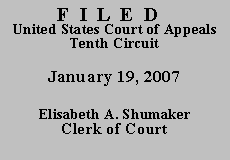

| UNITED STATES OF AMERICA,
Plaintiff-Appellee, v. JEFFREY D. TELLINGHUISEN, |
|
Background
Mr. Tellinghuisen pleaded guilty to possession of a firearm by a restricted person in violation of 18 U.S.C. §§ 922(g)(1), 924(a)(2). This was just one count in an eighteen-count indictment; the government dismissed the other seventeen counts in exchange for his guilty plea. His plea agreement included this appeal waiver:
Defendant knowingly and voluntarily waives any right to appeal or collaterally attack any matter in connection with this prosecution, conviction and sentence. The defendant is aware that Title 18, U.S.C. § 3742 affords a defendant the right to appeal the conviction and sentence imposed. By entering into this agreement, the defendant knowingly waives any right to appeal the conviction or a sentence imposed which is within the guideline range determined appropriate by the court. The defendant also waives any right to challenge a sentence or otherwise attempt to modify or change his sentence or manner in which it was determined in any collateral attack, including, but not limited to, a motion brought under Title 28, U.S.C. § 2255 [except as limited by United States v. Cockerham, 237 F.3d 1179, 1187 (10th Cir. 2001)] and a motion brought under Title 18, U.S.C. § 3582(c)(2). In other words, the defendant waives the right to appeal the sentence imposed in this case except to the extent, if any, the court departs upwards from the applicable sentencing guideline range determined by the court. However, if the United States authorizes its right to appeal the sentence imposed as authorized by Title 18, U.S.C. § 3742(b), the defendant is released from this waiver and may appeal the sentence received as authorized by Title 18, U.S.C. § 3742(a).
R. Vol. I, Doc. 23, at 3 (brackets in original). The district court conducted a thorough plea colloquy before accepting Mr. Tellinghuisen's guilty plea. It explained each provision in depth and gave particular attention to the appeal waiver. The court accepted Mr. Tellinghuisen's guilty plea only after satisfying itself that the plea was knowing and voluntary. The court then sentenced him to 120 months imprisonment.
Mr. Tellinghuisen did not appeal his sentence. Instead, he filed this habeas petition under § 2255, alleging that he received ineffective assistance of counsel. The district court denied his petition, ruling that the appeal waiver in his plea agreement barred it as a collateral attack on his sentence.
Discussion
The denial of a motion for relief under 28 U.S.C. § 2255 may be appealed only if the district court or this Court first issues a COA. 28 U.S.C. § 2253(c)(1)(B). A COA will issue "only if the applicant has made a substantial showing of the denial of a constitutional right." Id. § 2253(c)(2). To make such a showing, a petitioner must demonstrate that "reasonable jurists could debate whether . . . the petition should have been resolved in a different manner or that the issues presented were adequate to deserve encouragement to proceed further." Slack v. McDaniel, 529 U.S. 473, 48384 (2000) (internal quotation marks omitted).
Even under the liberal standard by which we judge a pro se litigant's pleadings, see Ledbetter v. City of Topeka, Kan., 318 F.3d 1183, 1187 (10th Cir. 2003), Mr. Tellinghuisen fails to convince us that the district court should have resolved his petition differently. The district court employed the correct three-part test we announced in United States v. Hahn, 359 F.3d 1315, 1325 (10th Cir. 2004) (en banc), to determine whether the appellate waiver in Mr. Tellinghuisen's plea agreement barred his § 2255 petition. It also correctly noted that a defendant with a valid appeal waiver may bring an ineffective assistance of counsel claim only when the alleged ineffective assistance "is 'in connection with the negotiation of the waiver.'" R. Vol. I, Doc. 26, at 2 (quoting Hahn, 359 F.3d at 1327).
None of the seven instances of ineffectiveness that Mr. Tellinghuisen alleges in his § 2255 petition motion relates to his attorney's negotiation of the appeal waiver. This same shortcoming plagues his arguments on appeal. See Appellant's Br. 4-17. Because none of these grounds are a permissible basis for avoiding his appellate waiver, Hahn, 359 F.3d at 1327, no reasonable jurist would debate whether the district court properly resolved his habeas petition.
Conclusion
Accordingly, we DENY Mr. Tellinghuisen's request for a COA and DISMISS this appeal.
Entered for the Court,
Michael W. McConnell
Circuit Judge
*.This order is not binding precedent except under the doctrines of law of the case, res judicata and collateral estoppel.